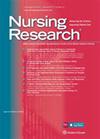心理资本对无家可归青少年的调解作用。
IF 2.2
4区 医学
Q1 NURSING
引用次数: 0
摘要
无家可归的青少年的行为使他们处于疾病和受伤的高风险之中。尽管他们有健康风险行为,但这些青少年显示出心理资本,即希望、效能、复原力和乐观主义等积极属性,促使他们参与促进健康的行为,如安全性行为。然而,人们尚未对这一弱势群体的一系列积极心理属性进行研究。本文章由计算机程序翻译,如有差异,请以英文原文为准。
Mediation of Psychological Capital in Youth Experiencing Homelessness.
Youth who experience homelessness engage in behaviors that place them at high risk for disease and injury. Despite their health risk behaviors, these youth display psychological capital, positive attributes of hope, efficacy, resilience, and optimism that motivate them to engage in health-promoting behaviors such as safer sex. However, this array of positive psychological attributes has not been studied in this vulnerable population.
求助全文
通过发布文献求助,成功后即可免费获取论文全文。
去求助
来源期刊

Nursing Research
医学-护理
CiteScore
3.60
自引率
4.00%
发文量
102
审稿时长
6-12 weeks
期刊介绍:
Nursing Research is a peer-reviewed journal celebrating over 60 years as the most sought-after nursing resource; it offers more depth, more detail, and more of what today''s nurses demand. Nursing Research covers key issues, including health promotion, human responses to illness, acute care nursing research, symptom management, cost-effectiveness, vulnerable populations, health services, and community-based nursing studies. Each issue highlights the latest research techniques, quantitative and qualitative studies, and new state-of-the-art methodological strategies, including information not yet found in textbooks. Expert commentaries and briefs are also included. In addition to 6 issues per year, Nursing Research from time to time publishes supplemental content not found anywhere else.
 求助内容:
求助内容: 应助结果提醒方式:
应助结果提醒方式:


